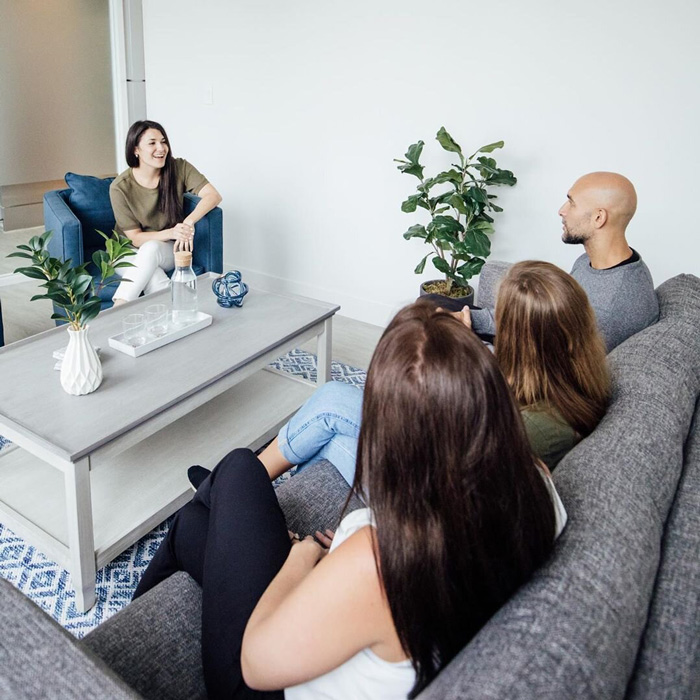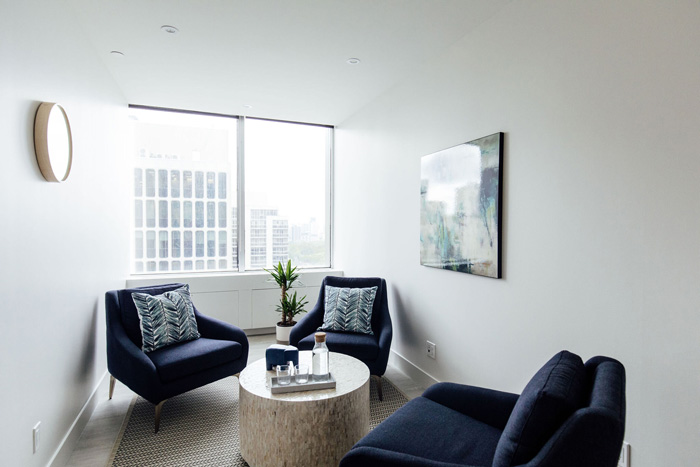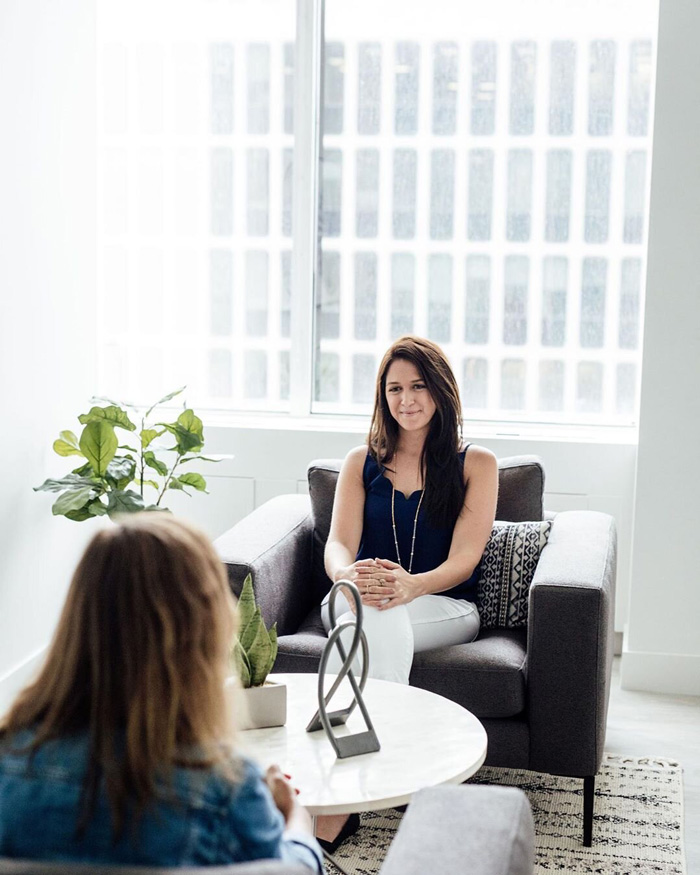Spotlight
October 6, 2020
Myths about the Mind: Modern Therapy with Straight Up Health
As part of the ongoing #WellnessYSC series at Yonge + St. Clair, we wanted to explore the modern myths about psychotherapy. We spoke with the founder of Straight Up Health, Jen Peacock who leads the therapy clinic at 2 St. Clair W, to learn more about the current views surrounding the practice and how the industry as a whole is making new ground in becoming an essential part of everyday self-care and healthy living.
Straight Up Health has an expert team that delivers therapy that’s fresh and relatable to the Yonge + St. Clair neighbourhood both in-person and virtually.
What you’ll find in this article: A Q+A about modern therapy, an actionable checklist for mental wellbeing, and an intro to the Straight Up Health clinic space.

Defining Modern, Mental Health
Yonge + St. Clair (YSC): What is therapy?
Jen Peacock, Straight Up Health (JP): Psychotherapy or “therapy” is a collaborative process between a client and mental health practitioner that is aimed at treating emotional and mental health issues. Therapy can be provided by a range of licensed professionals such as psychiatrists, psychologists, social workers and counsellors. There are many different kinds of therapy including Cognitive Behavioural Therapy (CBT); Mindfulness Based Cognitive Therapy (MBCT); Dialectic Behavioural Therapy (DBT); and Narrative Therapy. Regardless of the modality, one of the most important aspects of therapy is the therapeutic alliance. The therapeutic alliance is a working relationship between a therapist and their client which is aimed at benefiting the latter. A good therapeutic alliance is characterized by three essential qualities–an emotional bond of trust, empathy, genuineness and respect; an agreement on the tasks and objectives of treatment; and collaboration and mutuality. Although many factors impact whether or not therapy will be beneficial for the client, studies have consistently shown that the quality of the therapeutic alliance is the number one predictor of positive therapeutic outcomes.
YSC: Can you tell us about your practice and the timeliness of what you offer to a modern, Toronto population that may be experiencing a need for it – especially given the current state of at-home working, and lifestyle changes?
JP: Straight Up Health is a mental health, wellness and development clinic located here at midtown Toronto (Yonge + St. Clair) and virtually across Ontario. We offer accessible and empowering mental health care to teens, young adults and families. Our team of Registered Social Workers and Psychiatrists are highly specialized in supporting this demographic using a wide range of therapy modalities.
We work to break down stigma and normalize support, providing connective therapy options based on individual needs. Each client is matched with a therapist based on their unique preferences, needs and goals, because with therapy, fit is everything. Once matched, we set up a free consultation call with the best fit therapist for you. The process is quick, seamless and best of all, we have no waitlist! You can connect with a therapist today.
YSC: What are some of the sociocultural deterrents to accessing mental health care?
JP: Although we have made great strides in addressing the stigma attached to seeking professional help for mental health issues, stigma remains a major deterrent to accessing care. Common stigmatizing myths include the idea that those who seek therapy are weak or flawed. There is a difference between weakness and vulnerability. Vulnerability is about having the courage to show up as you are. Far from demonstrating weakness, being vulnerable enough to ask for support shows great strength. People who seek therapy do so for a variety of reasons ranging from difficult life transitions to complex mental illnesses. All are valid reasons for seeking help.
YSC: Looking ahead to the near future, what’s the upside to communities that give mental health the weight it deserves?
JP: When communities prioritize mental health, they promote healthier relationships between members on an interpersonal and professional level. Receiving mental health support allows people to better care for themselves and others. It also empowers individuals to communicate better and set healthy boundaries. Prioritizing mental health also enables communities to address and interrupt cycles of intergenerational trauma. Intergenerational trauma is a phenomenon where unaddressed trauma-related stress is passed down from survivors onto subsequent generations. It is important to note that community mental health involves more than therapy. It also includes addressing broader structural problems that contribute to mental health issues such as poverty and systemic discrimination.
Wellness to-dos:
YSC: What are some best practices you might recommend for the everyday person to do to keep up with good mental health – maybe an actionable checklist?
JP: Here are six everyday things that someone could do:
1) Develop a practice that enables you to feel and process your emotions without judgement. This can include a variety of mindfulness activities, such as meditation and grounding exercises. It can also involve regular journaling.
2) Prioritize rest when you can. Productivity is highly valued in our outcome focused culture but prioritizing rest supports your mental health and has the added benefit of improving the quality of your work by fueling creativity and ensuring that you move at a sustainable pace.
3) Develop a regular sleep routine. Maintaining a consistent nightly routine and sleeping at a regular hour will help to enhance the quality of your sleep. Studies consistently show that sleep wellness is critical to mental well being.
4) Try to maintain a healthy diet and engage in regular exercise. A well-balanced diet high in complex grains and rich in fruits and vegetables is known to have mood boosting properties. Regular exercise improves sleep and can alleviate symptoms of anxiety and depression.
5) Build a circle of loving and supportive individuals. This can include family members, friends and coworkers. Human beings are social creatures and we crave love, connection and belonging. Ensuring that we receive that is critical for our mental health.
6) Seek support when needed. Lean on your trusted circle when you are feeling sad, anxious or otherwise overwhelmed. Know that it is okay to seek professional help if you feel like you need the support of a trained practitioner.

Meet the team, owner and explore the space at Straight Up Health.
YSC: Can you highlight or describe some of the various spaces and their function in supporting the work you do with clients?
JP: At our Straight Up Health clinic we have 6 personal therapy rooms, as well as a larger room to facilitate the wellness workshops we run. We also have a waiting area with lots of great snacks to ensure you are energized for your session. Each room is private and confidential, is comfortable and built with the intention of creating a safe space for real talk.

YSC: Let’s talk about the team at Straight Up Health, are there any interesting stories behind the professionals that have helped guide them to pursue the field of mental health? And would you be open to sharing your story leading up to opening Straight Up Health?
JP: My personal story of starting a mental health clinic is based on the foundation of joining the Sick Kids Innovators Group which is a program that engages the next generation of philanthropists to support SickKids Foundation and speedily deploy funds in the areas of most need. Through this, it was glaringly obvious the need for more mental health support and resources, especially when it comes to youth. Youth and parents of youth need to have better access to resources and education about mental health in order to obtain the support they need.
Our team of therapists, psychiatrists and coaches are all educated and experienced in working with the youth demographic, and cover a wide range of modalities. Most of our team also currently work in a mental health capacity in the hospital system or the school system, so their day-to-day experience also lends itself nicely to the work they do in their private practice. Please find more about our team either through our IG account @straightuphealth.ca or our website www.straightuphealth.ca

YSC: Although we might not be able to speak directly to the individual cases, would you share some of the impacts that your team works to accomplish on a daily basis?
JP: At Straight Up Health, we view therapy as a highly collaborative process. Our therapists position clients as the experts on their own lives. As such, the desired impacts of therapy will depend on the values and needs of each client. Some clients may be seeking to understand their triggers; improve their personal relationships; or navigate a particularly challenging life transition. Regardless of the client’s therapeutic objectives, however, our therapists always aim to create a space of safety and support that empowers clients to explore their thoughts and feelings without judgement and address the issues that pushed them to seek help. We also strive to help clients develop the tools and resources they need to navigate the challenges they are facing. An important aspect of this is psychoeducation–i.e. equipping clients with knowledge and information that helps them to better understand and cope with mental health issues.

YSC: And ultimately, the vision of Straight Up Health.
JP: To connect with and support youth in a way that is empowering and accessible through any stage and phase of their mental health journey. Our team is dedicated to providing the tools and strategies to ensure that youth feel heard, seen and valued every step of the way.
YSC: What’s the best way to for someone to get in touch with your team? And are there any ongoing programs that you’d like people to be aware of?
JP: The first step is to reach out via email, phone or website. We can match you with the best therapist and get you set up with a free consultation call. You can also schedule your consultation call directly online through our online booking system.
Email: [email protected]
Phone: 416-666-5482
Website: www.straightuphealth.ca


